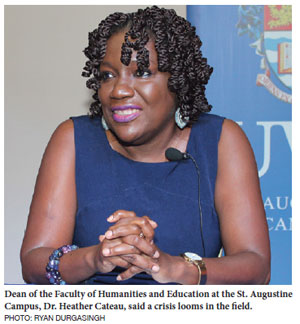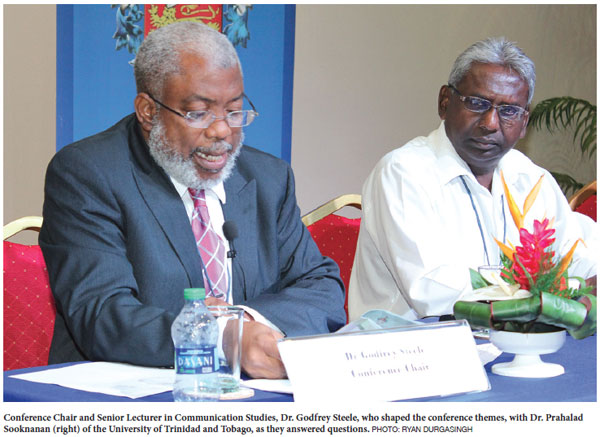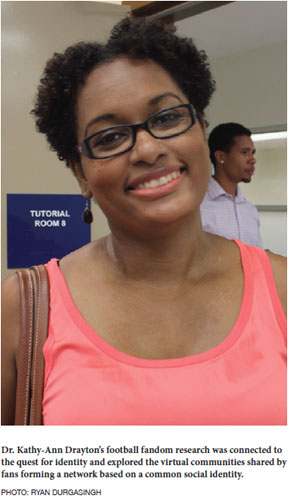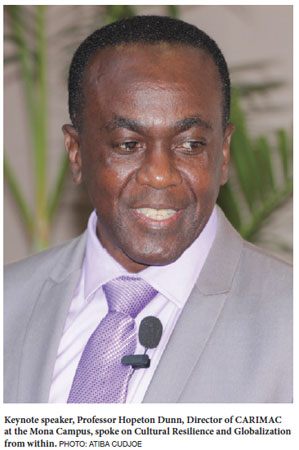 |
 |
 |
|
November 2015
|
She shared her concerns for the discipline of Communication and others under the Humanities umbrella and called for greater engagement showing the applicability and practicality of the areas of study. Just two days after the conference, the UK Guardian newspaper published a story “Japan’s humanities chop sends shivers down academic spines. Japanese universities are cutting humanities and social sciences in favour of ‘practical’ subjects, sparking global concern.” The article went on to detail very similar sentiments of The UWI Dean that esoteric research takes a back seat and is treated as less important. This however meets with the argument that in order for us to understand and innovate we need the cultural and historical research and understanding which the Humanities brings. Her push for us communicators to show the world our skill and its applicability to Caribbean and global society may be one of the reasons that resonated with the conference theme, “Identity, Context and Interdisciplinarity.” Conference Chair and Senior Lecturer in Communication Studies, Dr. Godfrey Steele and his team of planners including Dr. Korah Belgrave of the Cave Hill Campus and Dr. Livingston White from Mona, chose this theme to focus on the nature and development of human communication studies in the Caribbean, highlighting its many fields, including media, culture and society, interpersonal and family communication, organizational and corporate communications, and health communication.
Similar ideas necessitating relevance were expressed by Campus Principal, Professor Clement Sankat who shared his vision for the interaction among disciplines of Communication Studies with the main goal of offering a holistic experience for the student. He charged the faculty leaders to connect the Communication courses with other related fields on the Campus, including Film Studies, Animation and Media. This interdisciplinary approach he said, will seek to fill the society’s needs for an all-round communication programme. Keynote speaker, Professor Hopeton Dunn, Director of CARIMAC at the Mona Campus, offered an informative presentation which echoed sentiments expressed at the opening ceremony and plenary, with his talk, “Cultural resilience and Globalization from within.” While Dean Cateau opened the conference with the state of the Humanities globally and called for a response, so too did Professor Dunn with a rally cry for us to create our own content to become a society of ‘uploaders’ rather than ‘downloaders.’ He expressed the firm belief that there is no monopoly on good ideas and hence we as Caribbean communicators, should be producing and exporting more of our great innovations in research, products and services to the world. Calling on great Caribbean theorists and thinkers who went before like Rex Nettleford, Roderick Sanatan and Stuart Hall, he urged the crowd of Communicators, Marketers, Researchers and other professionals in the field to tell our own stories and not allow them to be told by others. Theories of cultural and media imperialism he said were all offered from the North and as Caribbean people, we have the knowledge, the skill and the capacity to present from our points of view. Communicate with usIt was evident at the end of the two-day conference that attendees benefited from practical takeaways spanning a wide range of topics, renewed relationships, new connections and a collective energy to move the discipline forward. Classes continue to be maxed out in the Communication courses at the St. Augustine Campus, but as we forge ahead, practitioners, employers and faculty should look critically into its future and longevity given the direction of the Humanities globally. Two avenues for this are contributions to The Journal of Human Communication Studies (The JHCSC) and The Association of Association of Human Communication Studies in the Caribbean AHCSC) Selected, double-blind, internationally peer-reviewed articles and essays are expected to be published in future issues of The Journal of Human Communication Studies in the Caribbean (The JHCSC), launched in May 2015. Online subscription and access to The JHCSC is US$55, and at a discounted rate of US$25 for students. An annual subscription to The JHCSC and AHCSC annual membership are mutually inclusive. At the business meeting which closed the conference, the AHCSC was launched officially, after ratifying the association’s aim and scope, plans for the founding executive board, widening the membership base, the development of a constitution and a programme of benefits and activities for members. The talk at the table
Among other topics, it examined issues such as identity and fandom in an online football community (Dr Kathy-Ann Drayton), the representation of national culture in the public websites and repositories managed by agencies such as NALIS (Revelino Guevara and Dr. Prahalad Sooknanan) and the influence of the Disney channel on the identity of adolescent girls (Casey Pereira-Smart and Dr Prahalad Sooknanan). This research was on the Media, Culture and Society panel. The Disney research looked at the channel’s contribution to the identity development of nine to 12 year-old girls in Trinidad and Tobago by examining content of its selected television programmes. The football fandom research was connected to the quest for identity and explored the virtual communities shared by fans forming a network based on a common social identity. The Interpersonal/Family Communication panel shared research on the communication challenges and experiences of families who are geographically separated (Maxine Maxwell) and compared the influence of face-to-face and online counselling on communication in the families of alcoholics (Anisa Hasanali). The Health and Risk Communication I panel celebrated the Green Market and the communication strategies used to promote a green and sustainable lifestyle (Ryan Jaggernauth), traced the public education and communication efforts of the UWI Seismic Research Centre (Omari Graham), and analysed the marketing communication strategies used in sugar sweetened beverages and their contribution to discourse on obesity in point of purchase communication (Chinyere Roberts and Dr. Godfrey A. Steele). The parallel panel, Organizational and Corporate Communications I, featured relationships among democratic and autocratic leadership styles, communication competence and subordinate responses (Donneyal Farray), and an example of internal communications research which studied the efficacy of communication modes used to engage employees. The Organizational and Corporate Communications II Special Professional panel was well-received and generated much discussion among younger communication professionals and their more experienced colleagues. Peter Neptune, Corporate Transformation and Communications Consultant, spoke on defending the brand and what accounts for good branding using examples from industry. He cited research that shows that brands that communicate frequently with their stakeholders “are more easily trusted, benefit from goodwill from investors, perform better in their markets, have more loyal customers and are more connected to their communities.”
Your brand exists in the public’s mind; it is all about perception and you must recognises its importance. Zero in on the attributes that you want to define you and invest in developing that brand, was her take. Daniel Plenty, Senior Manager, Corporate Communications, Water and Sewerage Authority, discussed the role of the communication professional in decision-making in an organization. He asked some key questions for organisations to consider in ascertaining what that role should be for them. “How high in the organizational structure should the communications practitioner be positioned?” he asked, as he wondered if it should be at the highest decision-making level. Dr Tara Wilkinson McClean of The UWI, Cave Hill applied communication and gender perspectives to examine male masculinities as reflected in popular male lifestyle magazines in Barbados and Paula Thomas reported her findings on the potential influence of teacher attire on students in secondary schools, in the panel on Communication, Culture and Gender. Using a clip from Alicia Keys’ “I don’t know your name,” Amanda Lewis examined the influence of popular love songs on young adult romantic relationships on the Political and Rhetorical/Influential Communication panel. This presentation generated discussion on male and female experiences and interpretations of the role of imagined interactions. On the Health and Risk Communication II Special Professional panel, Carlon Kirton, Communications Manager at the Caribbean Regional Health Agency (CARPHA), and Yvonne Lewis, Director, Health Education Division in the Ministry of Health addressed regional and national issues in Chikungunya public health communication activities and strategies. Dr Godfrey A. Steele shared insights into research on media coverage and patterns of reporting of the 2013-2014 outbreaks of Ebola in West Africa. For more on the conference presentations, please go to https://sta.uwi.edu/conferences/15/humancommunication/index.asp For more on the opening plenary, keynote address, pictures and social media, please visit https://sta.uwi.edu/conferences/15/humancommunication/socialmedia.asp |


 Opening the Human Communication Studies International Conference on the morning of a resplendent Republic Day, Dean Heather Cateau brought greetings and located the Communications discipline within the wider discourse on the Humanities. While the Communications programmes at the St. Augustine Campus are well subscribed, the reality is that a crisis looms in the study of Humanities courses overall.
Opening the Human Communication Studies International Conference on the morning of a resplendent Republic Day, Dean Heather Cateau brought greetings and located the Communications discipline within the wider discourse on the Humanities. While the Communications programmes at the St. Augustine Campus are well subscribed, the reality is that a crisis looms in the study of Humanities courses overall.  Dr. Steele indicated that the time had come to discuss and academic rationalization of academic programmes linking communication, journalism and film at UWI St. Augustine in a new configuration in keeping with global and regional trends.
Dr. Steele indicated that the time had come to discuss and academic rationalization of academic programmes linking communication, journalism and film at UWI St. Augustine in a new configuration in keeping with global and regional trends.  Adding to the discourse of other great Caribbean thinkers, conference presenters from Barbados, Jamaica and Trinidad and Tobago, joined minds and gave insights into a vast array of subject matters related to the discipline of Human Communication and featured academia, public sector and private sectors for this 2nd biennial conference.
Adding to the discourse of other great Caribbean thinkers, conference presenters from Barbados, Jamaica and Trinidad and Tobago, joined minds and gave insights into a vast array of subject matters related to the discipline of Human Communication and featured academia, public sector and private sectors for this 2nd biennial conference.  Yolande Agard-Simmons, Manager Corporate Communications in the Ministry of Trade and Industry, addressed developing one’s personal brand and image as a brand ambassador, investing in self, and maintaining professional standards.
Yolande Agard-Simmons, Manager Corporate Communications in the Ministry of Trade and Industry, addressed developing one’s personal brand and image as a brand ambassador, investing in self, and maintaining professional standards.